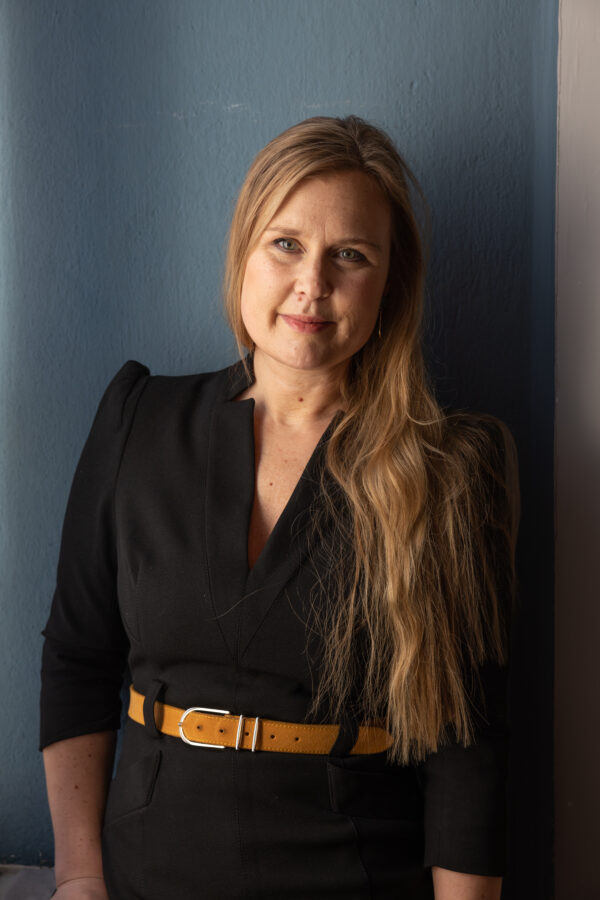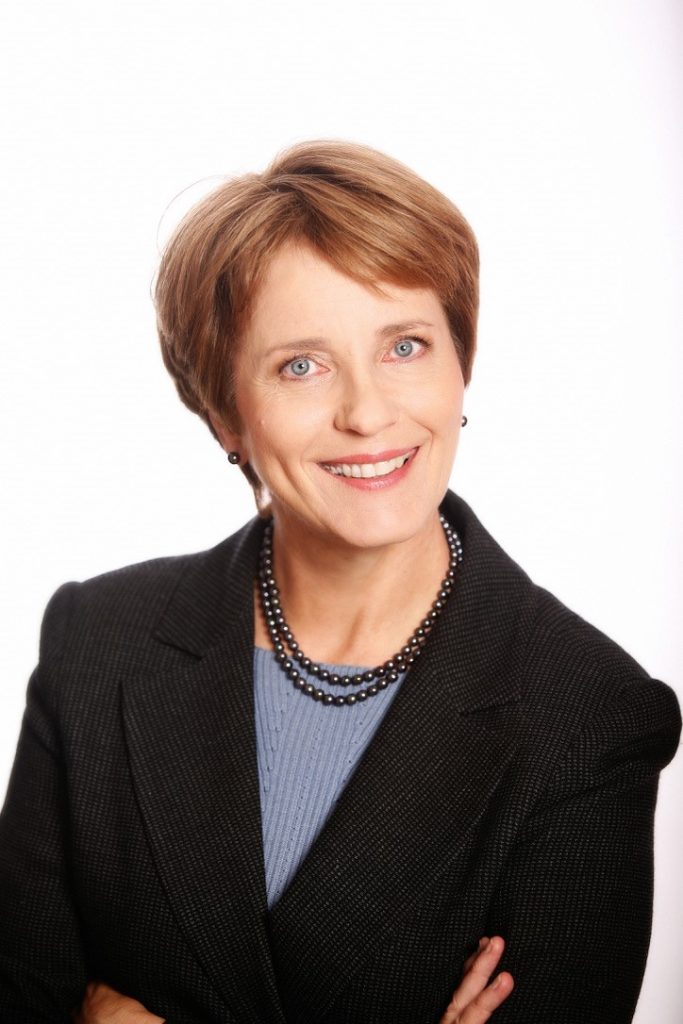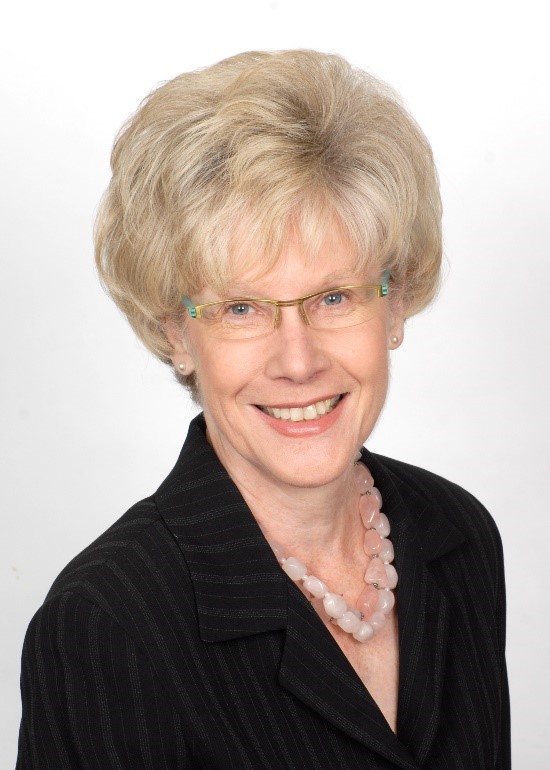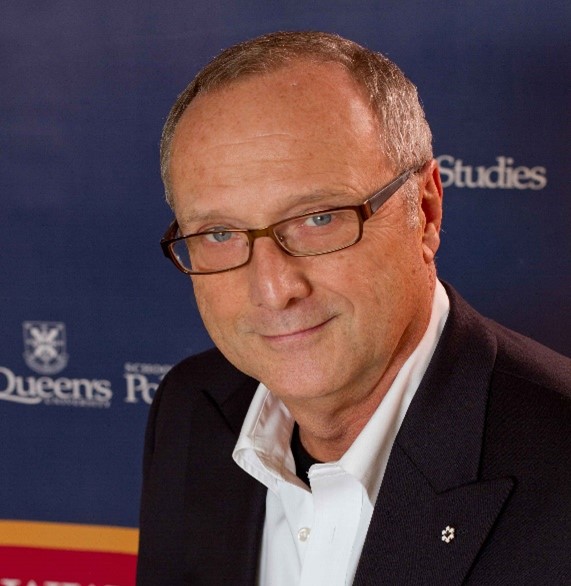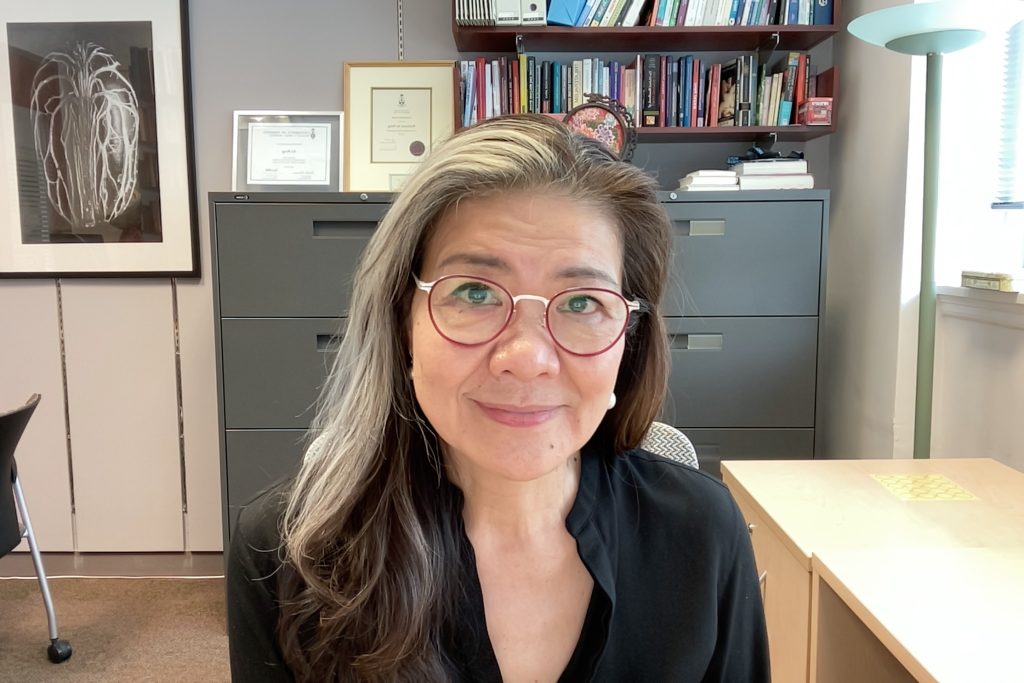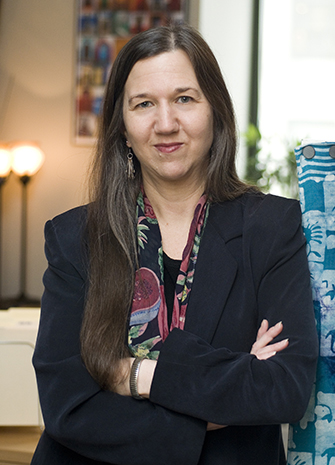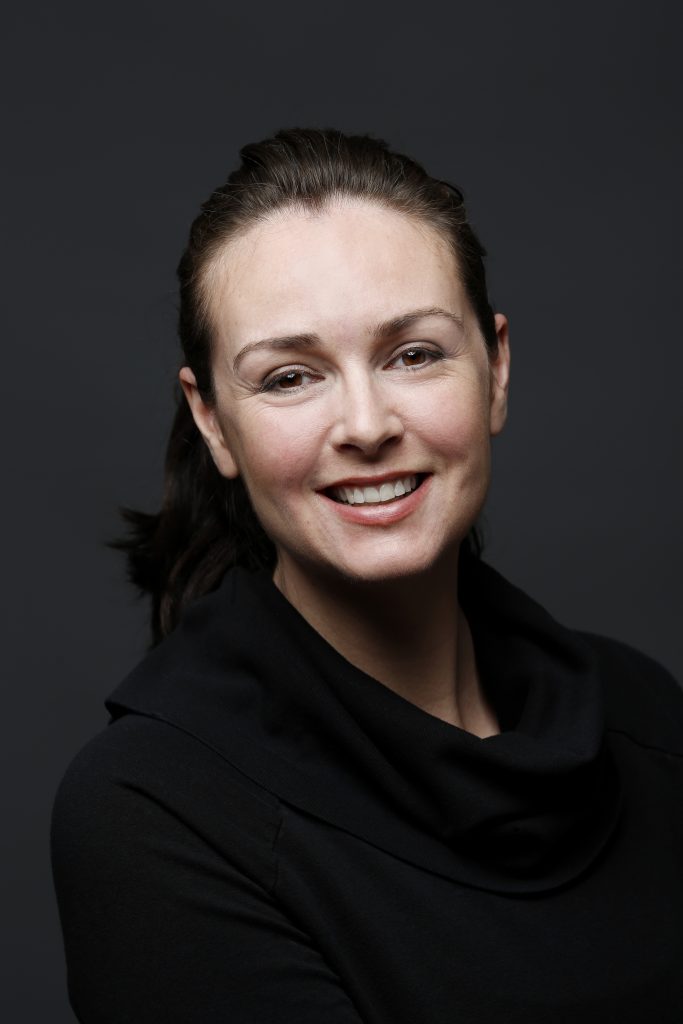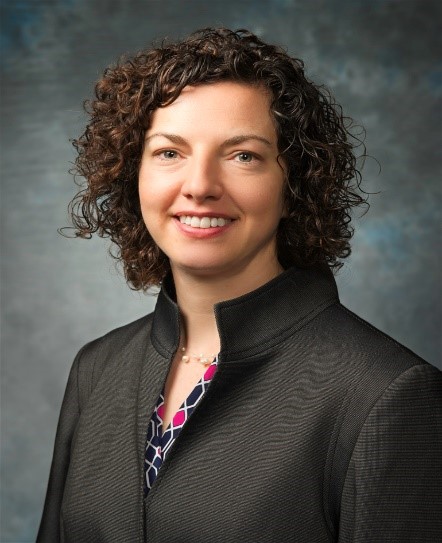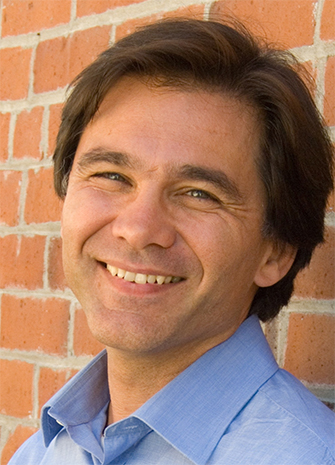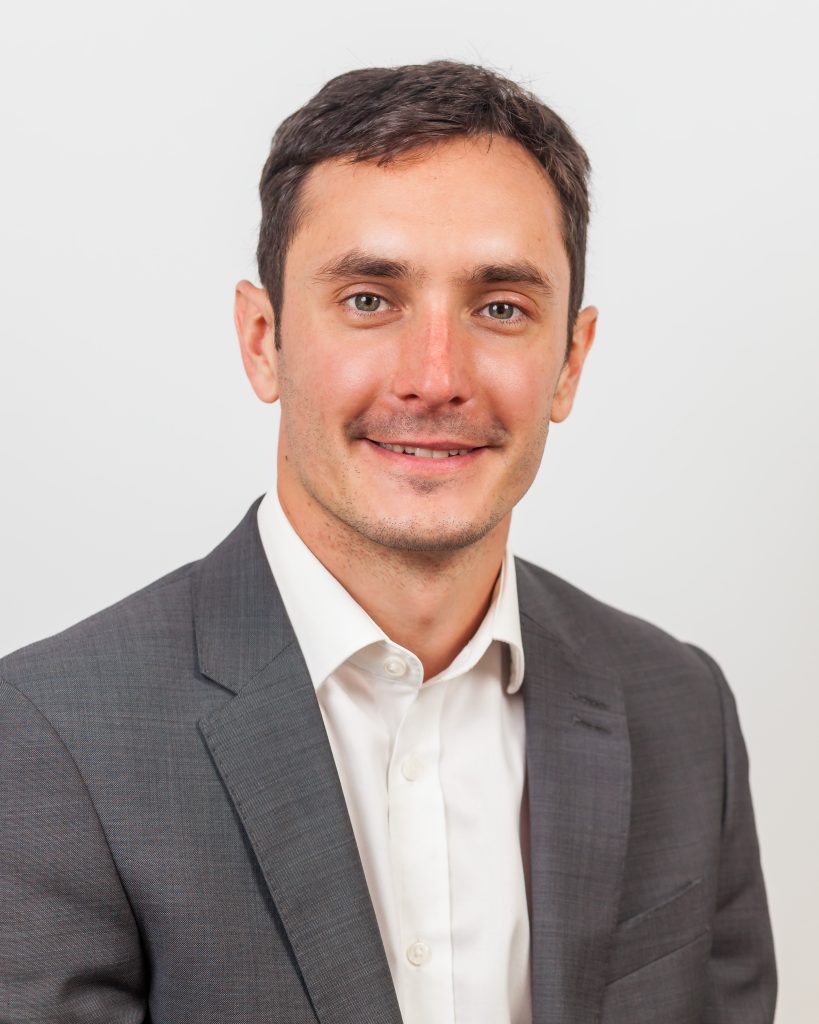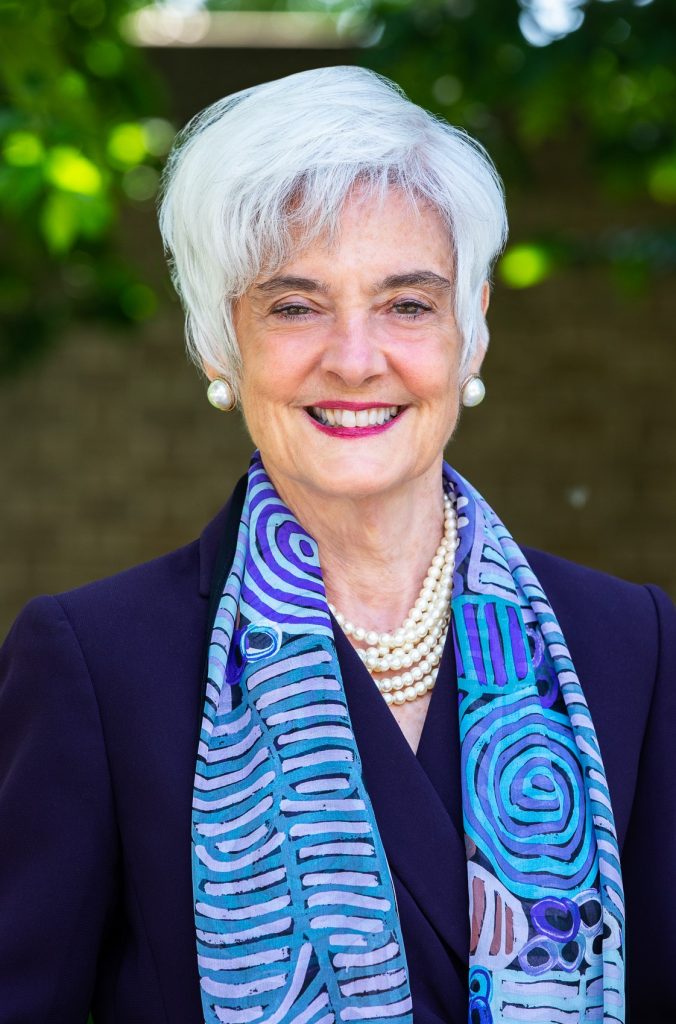2022 Munk School-Queen’s International Institute on Social Policy
October 31 – November 18, 2022
After a year’s COVID hiatus, Canada’s premiere social policy conference — the International Institute on Social Policy — is back, in a new partnership!
This year the Munk School of Global Affairs & Public Policy at the University of Toronto and the School of Policy Studies at the Queen’s University will host the 26th annual International Institute on Social Policy: Next Wave: Challenges and Opportunities for Social Policy in the Coming Decade.
For over two years, the COVID-19 pandemic high-jacked the policy agenda and necessarily focused attention on responses to the emergency. Meanwhile, new and enduring social, political, and economic challenges have been gathering force. The Munk School and Queen’s University are joining forces to bring together leading international and Canadian experts to consider whether and how we need to reform, or even transform, Canadian social policy for a more resilient and successful future.
- October 31, 2022 in-person: Launch conference at the Munk School on meta challenges and policy choices facing Canada and other OECD countries (registration fee applies). Register for the conference now.
- November 2 to 18, 2022 virtual webinars: Online policy seminars on major areas of social policy most in flux and ripe for rethinking (free registration). See the full list of seminars below to register.
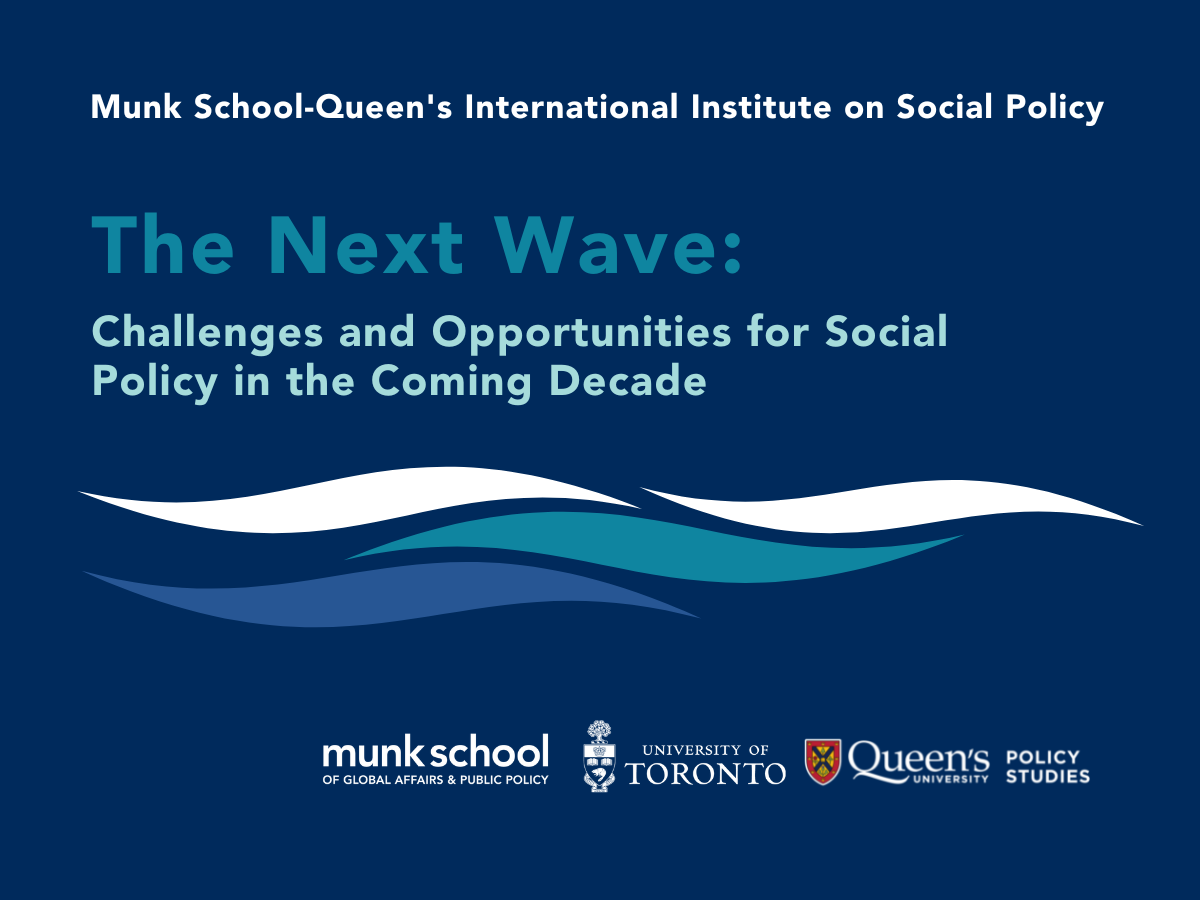
The Next Wave: Challenges and Opportunities for Social Policy in the Coming Decade
The 2022 International Institute on Social Policy will launch on October 31st with a day-long conference at the Munk School’s Campbell Conference Facility on the meta challenges and policy choices facing Canada and other OECD countries – socio-economic, generational and political. Featured speakers for the conference and policy series include:
Conference speakers include:
- Baroness Minouche Shafik, Director of the London School of Economics and author of What We Owe Each Other: A New Social Contract;
- Peter Loewen, Director, Munk School of Global Affairs & Public Policy
- Kevin Milligan, Professor, Vancouver School of Economics, University of British Columbia (UBC)
- Stefano Scarpetta, Director, Directorate for Employment, Labour and Social Affairs, OECD
- Catherine Adam; Senior Assistant Deputy Minister, Strategic and Service Policy; Employment and Social Development Canada
- Gina Gustavvson, Senior Lecturer/Associate Professor at Department of Government, Uppsala University
- Debra Thompson, Canada Research Chair at McGill University in Racial Inequality in Democratic Societies;
- Richard Johnston, Professor Emeritus, Department of Political Science, UBC
- Keith Banting, Professor Emeritus and Stauffer Dunning Fellow, Department of Political Studies and School of Policy Studies, Queen’s University
- Sean Speer, Editor-at-Large, The Hub; Senior Fellow, Munk School of Global Affairs and Public Policy
- Carolyn Tuohy, Professor Emeritus and Distinguished Fellow, Department of Political Science and Munk School of Global Affairs and Public Policy
- Naheed Nenshi, former Mayor of Calgary
- Margaret Biggs, Matthews Fellow in Global Public Policy, Queen’s School of Policy Studies
A curated series of online seminars will follow drilling into major areas of social policy most in flux and ripe for rethinking such as labour markets, income protection, immigration, and mental health. These policy panels will run virtually from November 2 – November 18, 2022.

The Next Wave: Conference program
Opening Day Conference – Monday October 31, 2022
Munk School of Global Affairs & Public Policy, University of Toronto
1 Devonshire Place, Toronto, ON
Welcome and Overview (10:00am – 10:15am)
Welcome by conference organizers. Overview of the day’s program.
Session 1 The shifting socio-economic landscape and horizon in Canada and across the OECD (10:15 am – 11:45 am)
The past 15 years have seen a succession of shocks across OECD nations which are playing out against the backdrop of an aging population, the green energy transition and the digital economy. They are also layering on top of long-term trends related to the rise and persistence of inequality and generational inequities. How are these shocks and long-term trends intersecting? What socio-economic challenges are on and over the social policy horizon?

Kevin Milligan, Professor, Vancouver School of Economics, University of British Columbia (UBC)
Kevin Milligan is Professor of Economics in the Vancouver School of Economics at the University of British Columbia, Scholar-in-Residence with the C.D. Howe Institute, and Research Associate of the National Bureau of Economic Research. Since 2011, he has served as Co-Editor of the Canadian Tax Journal. He studied at Queen’s University and the University of Toronto, receiving his Ph.D. in 2001. His published research in over 100 articles spans the fields of public and labour economics, with a primary focus on how the Canadian tax and transfer system affects economic decisions and wellbeing. In 2020-21, he served as Special Advisor (Economic Recovery) in the Privy Council Office.
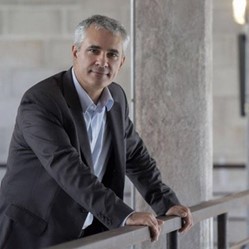
Stefano Scarpetta, Director, Directorate for Employment, Labour and Social Affairs, OECD
Stefano Scarpetta has been the Director of the Employment, Labour and Social Affairs (ELS) Directorate of the OECD since 2013. He leads the work of the Organisation in a number of broad areas including Employment, Labour, Migration, Health, Skills, Gender and Tackling Inequalities and contributes to the implementation of the Secretary-General’s strategic orientations in these areas. Stefano represents the OECD in the G20 and G7 and many other high-level international fora on labour market, social, migration and health issues. Under his leadership, ELS provides continuous assistance and support to countries in the design, implementation and evaluation of polices drawing from evidence-based analyses of how policy affects different economic, labour and social outcomes. His advice has contributed to numerous policy reforms in OECD countries and beyond, and new policy thinking in areas ranging from inequalities, labour market inclusion and the future of work, social protection for all, the integration of migrants, the economics of public health and patient-centred health care.

Moderator: Catherine Adam; Senior Assistant Deputy Minister, Strategic and Service Policy; Employment and Social Development Canada
Catherine Adam was appointed to the position of Senior Assistant Deputy Minister of the Strategic and Service Policy Branch at Employment and Social Development Canada in August 2017.
Prior to joining Employment and Social Development Canada, Catherine was the Assistant Secretary to Cabinet for Intergovernmental Affairs Policy with the Privy Council Office (PCO), and the Associate Assistant Deputy Minister of Federal–Provincial Relations and Social Policy at the Department of Finance.
She has extensive experience in social and economic policy issues in Canada including labour market, income security, early learning and childcare, health policy, Indigenous programming and policies and intergovernmental affairs.
Lunch (11:45am-12:30pm)
Keynote: Challenges and Opportunities for Social Policy in the Coming Decade (12:30pm – 1:30pm)

Minouche Shafik
Director, London School of Economics; Author, What We Owe Each Other: A New Social Contract
Nemat (Minouche) Shafik is a leading economist, whose career has straddled public policy and academia. She was appointed Director of the London School of Economics and Political Science in September 2017. She did her BA at the University of Massachusetts-Amherst, her MSc at LSE and her DPhil at the University of Oxford and, by the age of 36, had become the youngest ever Vice President of the World Bank. She taught at Georgetown University and the Wharton Business School. She later served as the Permanent Secretary of the Department for International Development from 2008 to 2011, Deputy Managing Director of the International Monetary Fund from 2011-2014 and as Deputy Governor of the Bank of England from 2014-2017, where she sat on all the monetary, financial and prudential policy committees and was responsible for a balance sheet of over £500 billion. Minouche has served on and chaired numerous boards and currently serves as a Trustee of the British Museum, the Supervisory Board of Siemens, the Council of the Institute for Fiscal Studies, and the Economy Honours Committee. She was made a Dame Commander of the British Empire in the Queen’s Birthday Honours list in 2015. In July 2020 Minouche was made a cross-bench peer in the House of Lords.

Moderator:
Peter Loewen, Director, Munk School of Global Affairs & Public Policy
Professor Loewen teaches in the Department of Political Science and the Munk School of Global Affairs and Public Policy. He is the Director of PEARL, Associate Director of the Schwartz Reisman Institute, a Senior Fellow at Massey College, and a Fellow with the Public Policy Forum. For 2020-2022, he is a Distinguished Visitor at the Institute for Advanced Study at Tel Aviv University.
Professor Loewen received his B.A. from Mount Allison University (2002) and his PhD from l’Université de Montréal (2008). He held postdoctoral fellowships at the University of British Columbia and the University of California at San Diego. Since joining the University of Toronto Mississauga in 2010, he has held visiting positions at the Melbourne School of Government at the University of Melbourne, the Center for the Study of Democratic Politics at Princeton University, and the Center for Advanced Study in the Behavioral Sciences at Stanford University.
Break (1:30pm – 1:45pm)
Session 2 Roundtable: Trust, Social Divisions and Governance (1:45pm -3:15pm)
The last few years have seen marked by economic shocks, polarization, and populist challenges to democratic norms across OECD countries. In Canada, the Black Lives Matter movement and the reconciliation agenda have heightened demands for social justice. But resistance to restrictions adopted during the pandemic and the rising cost of living are generating resistance to reformist agendas. There has also been an epidemic of misinformation and widespread mistrust of expert opinion and political leaders. What are the implications for social cohesion and for the capacity of governments to achieve social policy priorities?
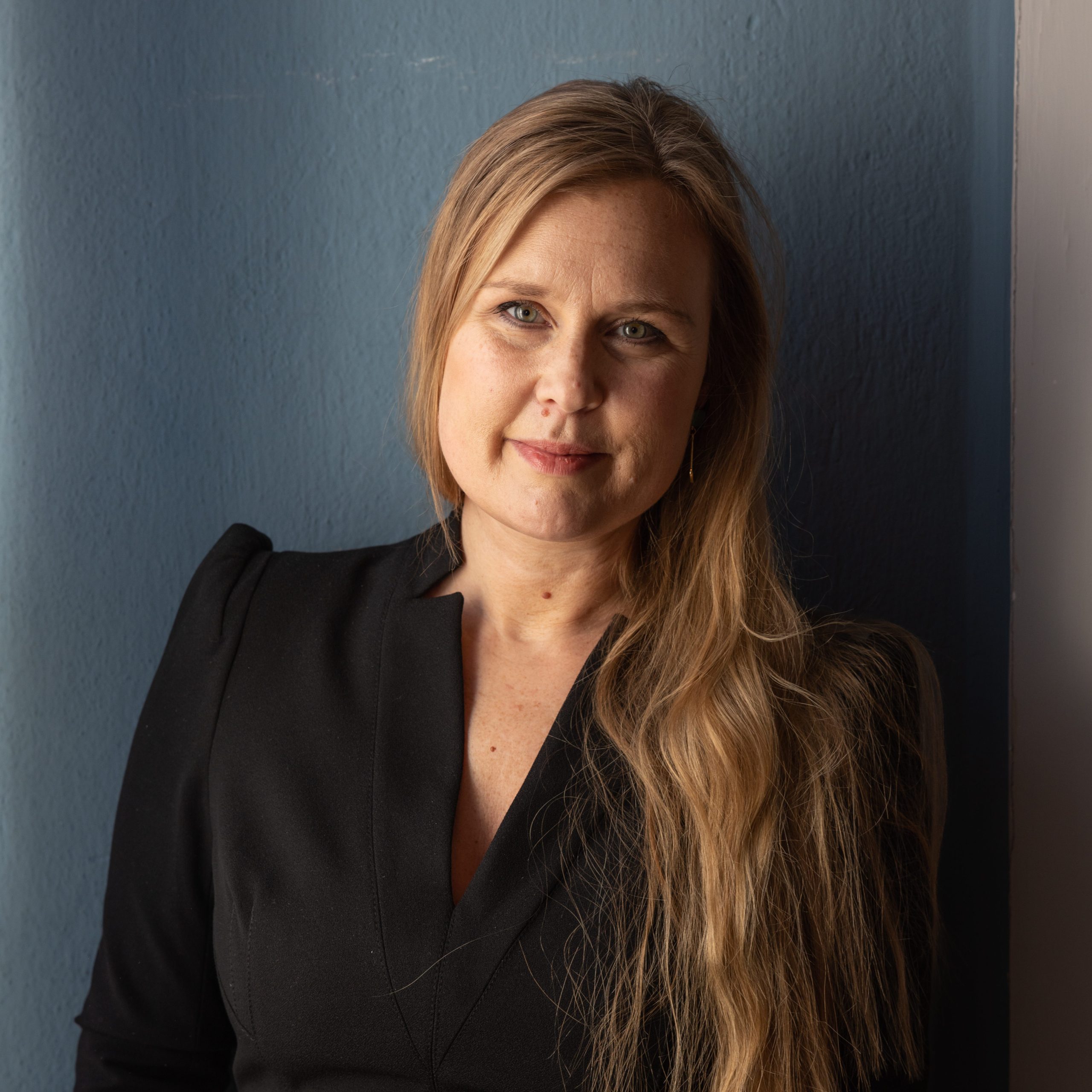
Gina Gustavsson, Uppsala University Sweden
Gina Gustavsson is a senior lecturer at the Department of Government, Uppsala University, and has for several years been an associate member of Nuffield College, University of Oxford. Her research spans political theory and political psychology, and she is currently leading a cross-national research project called Nationhood in a Pandemic, Nordic Gold or Nordic Noir? The Interplay between National Identity, Political Trust, Affective Polarization, and Attitudes to Immigrants in Denmark and Sweden in 2020-2021. Her research has been published in the European Political Science Review, Ethnicities, Nations & Nationalism, Ethnic & Racial studies, Political Studies, and the Review of Politics, as well as in a volume she has edited together with David Miller for Oxford University Press. She has also written a book on Sweden’s controversial covid strategy and its relation to the national identity (“Du stolta, du fria”, 2021), and published op-eds on this topic in the Guardian and the Washington Post.

Debra Thompson, Canada Research Chair in Racial Inequality in Democratic Societies, McGill University
Dr. Debra Thompson is an Associate Professor of Political Science and Canada Research Chair in Racial Inequality in Democratic Societies at McGill University. She is a leading scholar of the comparative politics of race. Her academic research and teaching, along with her commitment to public scholarship, seek to understand, analyze, and explain the complex historic and contemporary relationships among race, public policy, and inequality in Canada and other democratic societies. Dr. Thompson’s award-winning first book, The Schematic State: Race, Transnationalism, and the Politics of the Census (Cambridge University Press, 2016) is a study of the political development of racial classifications on the national censuses of the United States, Canada, and Great Britain. Her best-selling second book, The Long Road Home: On Blackness and Belonging was published by Scribner Canada (an imprint of Simon & Schuster) in September 2022 and is a finalist for the Hilary Weston Writers’ Trust Prize for Nonfiction.

Richard Johnston, Professor Emeritus, Department of Political Science, UBC
Richard Johnston (PhD Stanford) is Professor Emeritus of Political Science and Canada Research Chair Emeritus in Public Opinion, Elections, and Representation at UBC. He has also taught at the University of Toronto, the California Institute of Technology, Harvard University (Mackenzie King chair, 1994-5), and the University of Pennsylvania. He is the author or co-author of six books, four on Canadian politics and two on US Politics. He has co-edited five other books and has written 100 articles and book chapters. Much of his work focuses on party systems, elections and public opinion, in Canada, the US, and Germany. His other main preoccupation is with the complex of issues in immigration, diversity, multiculturalism, and the welfare state in Canada and in the OECD. He was Principal Investigator of the 1988 and 1992-3 Canadian Election Studies and Research Director for the National Annenberg Election Survey (Penn), 2000-8. He was the director of survey for the Major Collaborative Initiative on Equality, Security, and Community. In 2007-8 he was president of the Canadian Political Science Association. In 2017, he was given the Mildred Schwartz prize for lifetime achievement in the study of Canadian politics.
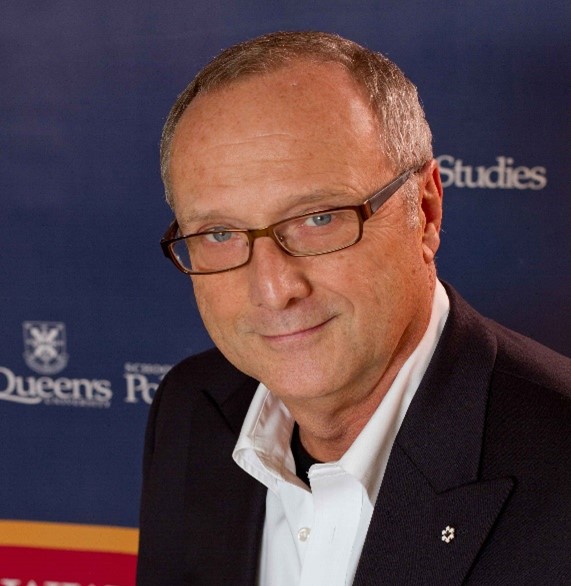
Keith Banting, Professor Emeritus and Stauffer Dunning Fellow, Department of Political Studies and School of Policy Studies, Queen’s University
Keith Banting is Stauffer Dunning Fellow and Professor Emeritus at Queen’s University. His research has long focused on the politics of social policy, which he has extended to include the relationship between multiculturalism and immigration on one hand and support for social programs on the other.
In the field of social policy, Dr. Banting is the author of The Welfare State and Canadian Federalism. Hiis more recent contributions include Inequality and the Fading of Redistributive Politics, and “Framing the New Inequality: The Politics of Income Redistribution in Canada”, (both with John Myles). He retains his old interest in federalism, and recently published “The Three Federalisms and Change in Social Policy”. In the field of multiculturalism, Professor Banting is an editor (with Will Kymlicka) of Multiculturalism and the Welfare State: Recognition and Redistribution in Contemporary Democracies. More recently, they published The Strains of Commitment: The Political Sources of Solidarity in Diverse Societies (2017). His most recent article in this field is “The Puzzling Persistence of Racial Inequality in Canada, co-authored with Debra Thompson (2021). Professor Banting is a member of the Order of Canada and Fellow of the Royal Society of Canada.
Session 3 Roundtable: Key Take-aways – Shifts, Challenges and Priorities for Action (3:15pm – 4:15pm)
This session will take stock of the main take-aways from the day’s deliberations — the most significant social, economic and political shifts facing Canada over the next five to ten years; priorities for action; whether we have the policy levers, capacity and data to understand and respond to complex and high-velocity trends.

Sean Speer, Editor at Large, The Hub; Senior Fellow, Munk School of Global Affairs and Public Policy
Sean Speer is The Hub’s editor-at-large and Senior Fellow at the Munk School of Global Affairs and Public Policy and project co-director of the School’s Ontario 360 research project. Sean is also currently the PPF Scotiabank Fellow for Strategic Competitiveness at the Public Policy Forum and editor at large at The Hub. He previously served as a senior economic adviser to former Prime Minister Stephen Harper.

Carolyn Tuohy, Professor Emeritus and Distinguished Fellow, Department of Political Science and
Munk School of Global Affairs and Public Policy
Carolyn Tuohy is a professor emeritus of political science and distinguished fellow at the University of Toronto’s Munk School of Global Affairs and Public Policy. She holds a B.A. from the University of Toronto, and an M.A. and Ph.D. in Political Science from Yale University. She specializes in comparative public policy, with an emphasis on social policy. Her most recent book is Remaking Policy: Scale, Pace and Political Strategy in Health Care Reform (University of Toronto Press 2018). She is currently working on a book on the power of narrative discourse in public policy. Other publications include Accidental Logics: the Dynamics of Change in the Health Care Arena in the United States, Britain and Canada (Oxford University Press 1999), Policy and Politics in Canada: Institutionalized Ambivalence (Temple University Press 1992), four co-edited books and numerous journal articles and book chapters on health and social policy, professional regulation, and comparative approaches in public policy. From 1992-2005 she served in the senior administration of the University of Toronto as Deputy Provost and as Vice-President, Government and Institutional Relations. She has served as a member of the Board of Directors and the Scientific Advisory Committee of the Institute for Clinical Evaluative Sciences (ICES) and as Vice-Chair of the Boards of Directors of the Institute for Work and Health and of the Canadian Heath Services Research Foundation (now the Canadian Foundation for Healthcare Improvement). She was Founding Fellow of the School of Public Policy and Governance at the University of Toronto (now merged with the Munk School), and is a Fellow of the Royal Society of Canada.

Naheed Nenshi, former mayor of Calgary
Naheed K. Nenshi served as Calgary’s mayor for three terms between 2010 and 2021. During his time, Calgary became one of the greatest cities in the world, named as the best city in which to live in the Western Hemisphere. His leadership saw an unprecedented investment in quality of life including transit, roads, recreation centres and libraries including the magnificent Central Library, while keeping taxes the lowest in Canada. His time as mayor also saw the City of Calgary through four states of emergency, including devastating flooding in 2013 floods and the COVID-19 pandemic. He also became an international voice on urban issues, with audiences across Canada and around the world, including the World Economic Forum in Davos. Naheed was awarded the World Mayor Prize as the best mayor in the world in 2014 by The City Mayors Foundation. He also has received the President’s Award from the Canadian Institute of Planners and the Humanitarian Award from the Canadian Psychological Association for his contribution to community mental health. Maclean’s magazine once called him the second-most influential person in Canada, after the Prime Minister, much to the amusement of his mother.
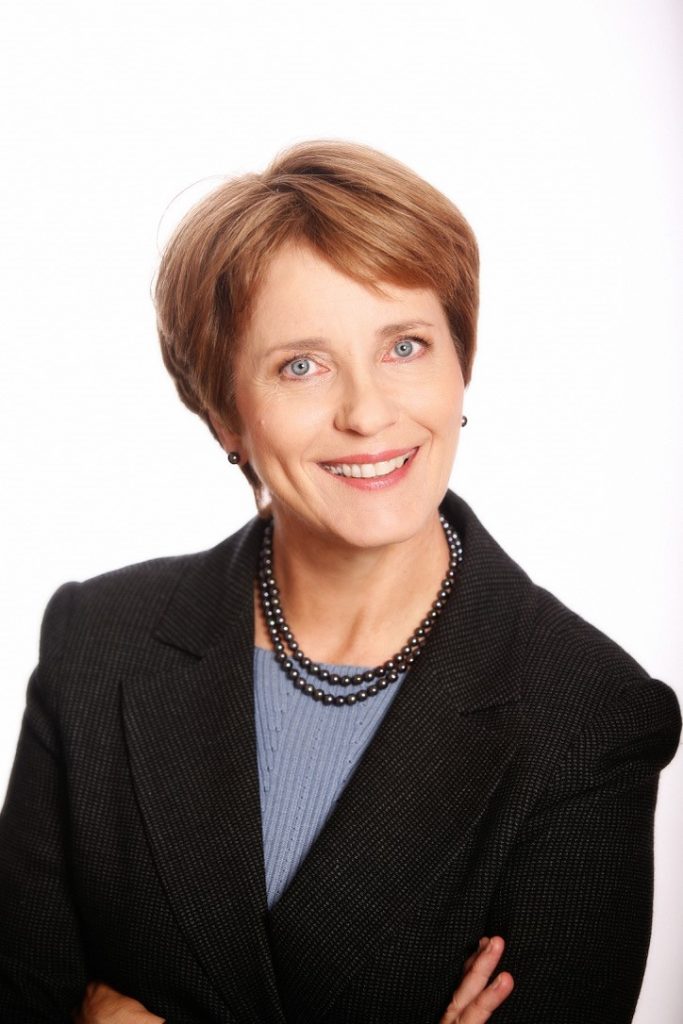
Margaret Biggs, Matthews Fellow in Global Public Policy, Queen’s School of Policy Studies
Margaret Biggs is currently the Matthews Fellow in Global Public Policy at Queen’s University and a Nonresident Senior Fellow at the Center for Sustainable Development, Brookings Institution. Ms Biggs previously served as Deputy Secretary to the Cabinet, Priorities and Planning, in the Privy Council Office (PCO), and as President of the Canadian International Development Agency (CIDA). She was also Assistant Deputy Minister responsible for policies and programs in the areas of social development, labour markets, and skills and learning in the Government of Canada. Ms Biggs currently serves on numerous Canadian and international boards and advisory bodies including World Universities Service Canada (WUSC), the McCall-MacBain Foundation, FinDevCanada, the International Foundation for Electoral Support and Global Skills Opportunity. She co-led the Study Group on Global Education’s report Equipping the Next Generation of Canadians to Succeed in a Complex World.
Close and Look Ahead (4:15pm – 4:30pm)
Challenges and Opportunities for Social Policy in the Coming Decade: Policy Seminar Series
The policy seminars will be organized in part by policy sector, focusing on the tools available in different sectors; however, each panel will consider how policies interconnect, and how vulnerable groups intersect to create concentrations of advantage and disadvantage. Sessions will take place online, running from November 2 until November 18, 2022.
Read more about each session below and register to attend online.

Session 1 – The Labour Market: What’s going on? What role for public policy?
Wednesday, November 2, 2022 (12:00pm – 1:30pm)
For many years, policy makers and researchers in Canada and other OECD countries have been focused on the future of work and skills, particularly the impact of new technologies on the skills composition of jobs, prospects for different occupations and the nature of work. At the same time, the covid pandemic has had lasting impacts on the labour market, for example many workers are seeking more flexible work arrangements while others are looking to early retirement, resulting in significant labour shortages. Energy transitions and an aging workforce are also adding new dynamics. How significant are these trends? Are they significantly altering labour market supply and demand, skills composition, and the workplace? What have we learned about recent policy responses, in Canada and peer countries?
Speakers:
Stéphane Carcillo, Head, Jobs and Income Division, Directorate for Employment, Labour and Social Affairs, OECD. (Stephane.CARCILLO@oecd.org)
David Green, Professor, Vancouver School of Economics, UBC (david.green@ubc.ca)
Moderator: Karen Myers, President and CEO, Blueprint
Session 2 – Income Protection
Friday, November 4, 2022 (12:00pm – 1:30pm)
Existing income support programs, such as employment insurance, have increasingly been shown to leave many workers unprotected against job losses. New and rapidly changing labour market landscapes indicate a need for rethinking income security both in and out of work. Building on insights and experiences from Canada and other countries over the last few years, this panel will examine key questions related to income and employment security in the context of new world of work.
Janet Gornick, Director, Stone Center on Socio-Economic Inequality, The Graduate Center, CUNY
Robert Joyce, Deputy Director and Head Income, Work and Welfare; Institute for Fiscal Studies
Jennifer Robson, Associate Professor, Kroeger College, Carleton University
Moderator: Miles Corak, Professor of Economics, Stone Center on Socio-Economic Inequality
Session 3 – Immigration
Monday, November 7, 2022 (12:00pm – 1:30pm)
Canada’s economic immigration system leans heavily on the selection of skilled immigrants with high human capital. Certain sectors of the economy, including agri-food, hospitality and long-term care are left to rely on temporary foreign workers with little access to permanent resident status. At the same time, skilled immigrants in regulated occupations are under-employed because of the lack of recognition by regulatory bodies and employers of their qualifications and experience achieved abroad. These problems were highlighted during the pandemic, when the concept of “essential workers” led to some short-term measures to respond to acute labour shortages. Current debates in Canada are asking whether our immigration policies should be modernized to reflect our changing labour and skill needs at all points of our labour market continuum. What can we learn from other countries’ experiences?
Speakers:
Professor Martin Ruhs, Chair in Migration Studies and Deputy Director of the Migration Policy Centre (MPC), European University Institute (EUI), Florence
Rupa Banerjee, Canada Research Chair in Economic Inclusion, Employment and Entrepreneurship of Canada’s Immigrants; Associate Professor of Human Resource Management and Organizational Management; Toronto Metropolitan University
Moderator: Marian Campbell-Jarvis, Assistant Deputy Minister, Strategic and Program Policy, Immigration, Refugees and Citizenship Canada.
Session 4 – The Care Economy
Wednesday, November 9, 2022 (12:00pm – 1:30pm)
The care sector (including childcare, long-term care, education, and other direct and indirect care services) is now understood to be a key engine of economic growth and employment generation. Lack of adequate high-quality childcare constrains workforce participation and is a source of continuing stress for many families. Lack of high-quality options for long-term care leads to poor health outcomes and places additional stress on other social institutions (notably hospitals) and on families. Inadequate care facilities are also plagued by staff shortages and poor working conditions. Canadian federal and provincial governments are making significant investment in child care through the Early Learning and Child Care (ELCC) agreements. Will these arrangements solve Canada’s child care problems?
Speakers:
Laura Turquet, Policy Advisor and Deputy Chief of Research and Data, UN Women
Ito Peng, Canada Research Chair in Global Public Policy, Director, Centre for Global Social Policy, Department of Sociology and Munk School of Global Affairs and Public Policy, University of Toronto
Moderator: James Janeiro, Director, Policy and Government Relations; Canadian Centre for Caregiving Excellence
Session 5 – Community and Housing
Friday, November 11, 2022 (12:00 – 1:00pm)
Increasingly we are coming to understand the importance of ‘place’ in public policy. The affordability of homes, the quality of public spaces, the availability of public transportation and other amenities of daily living varies enormously and creates self-reinforcing pockets of advantage and disadvantage that deepen social divides and incubate a range of challenges. The uneven distribution of public and community services creates under-serviced areas in urban, suburban, exurban and rural settings. How can a focus on place-based policy open new ways of thinking and innovation in policy and service provision?
Speakers:
Karen Chapple, Director, School of Cities, University of Toronto
Michelle Norris, Professor of Social Policy; Director, Geary Institute for Public Policy; University College Dublin
Moderator: Denise Andrea Campbell, Executive Director of Social Development, Finance and Administration, City of Toronto
Session 6 – Health care: Systemic issues and solutions
Monday, November 14, 2022; 12:00pm –1:30pm)
Canada’s healthcare system urgently requires renewal. Our hospital-centric system drives too much care into hospitals at the front end (over-use of emergency departments due to lack of accessible primary care) and at the back end (extended lengths of hospital stays due to inadequate long-term care provision). At the same time a long-standing emphasis on running hospitals as lean as possible has resulted in levels of health human resources well below the norm for peer nations. In sum, hospitals lack surge capacity and there is inadequate “continuum of care” across major healthcare sub-sectors – primary care, hospitals, home care and long-term care facilities. What should be our priorities for the next five years? How can information technology and virtual care be better exploited? Canada has been an international laggard; change will require overcoming multiple barriers to the linkage of information systems.
Sara Allin, Associate Professor, Dalla Lana School of Public Health; Director, North American Observatory on Health Systems and Policies
Josep Figueras, Director, WHO European Observatory on Health Systems figuerasj@obs.who.int
Moderator: Chris Simpson, Executive Vice President (Medical) and Chief Medical Officer, Ontario Health
Sara Allin, Associate Professor, Dalla Lana School of Public Health; Director, North American Observatory on Health Systems and Policies
Josep Figueras, Director, WHO European Observatory on Health Systems figuerasj@obs.who.int
Moderator: Chris Simpson, Executive Vice President (Medical) and Chief Medical Officer, Ontario Health
Session 7 – Falling through the cracks
Wednesday, November 16, 2022; 12:00pm – 2:00pm
Persons with disabilities (12:00pm – 1:00pm)
Like all Canadians, people with disabilities and chronic health conditions rely on four key institutions for economic support: labour markets, savings/credit markets, family, and government supports. Accessing each, or a combination, presents barriers of various sorts, such as stringent and/or complex eligibility requirements imposed by government programs and financial institutions, labour market fluctuations, limited household resources, stresses on informal caregivers, and limited awareness of available support. Pandemic-related supports like CERB helped many working people with disabilities health in different ways and revealed the gaps in the existing infrastructure. This experience, as well as models of support in other jurisdictions, further illustrated the need and the possibilities for re-thinking support for people with disabilities.
Speakers:
Michael Prince, Lansdowne Professor of Social Policy, University of Victoria. (mprince@uvic.ca)
Susanne Bruyère, Professor of Disability Studies, Director of the Yang-Tan Institute on Employment and Disability, Cornell University. susannebruyere@cornell.edu
Moderator: Sherri Torjman, Former Vice President, Caledon Institute on Social Policy
Mental Health (1:05pm – 2:00pm)
The human, social and economic costs of mental illness in Canada are huge, and unevenly borne. According to the Centre for Addiction and Mental Health (CAMH), “mental illness is a leading cause of disability in this country, preventing nearly 500,000 employed Canadians from attending work each week.” One-third of Canadians aged 15 or older and 75 percent of children have mental health care needs that are not being fully met. Mental health and addiction often co-occur. Homelessness is sometimes the result. While these issues cut across all socio-economic groups, some are more adversely impacted. For example, Aboriginal youth are about five to six times more likely to die by suicide than non-Aboriginal youth. There are no simple answers. Addressing these critical problems means mobilizing resources at multiple levels – communities and governments. What are priorities for action? What is known about best practices? What barriers need to be overcome such as lack of integrated services?
Speakers:
Kwame McKenzie, Director of Health Equity, Centre for Addiction and Mental Health (CAMH)
Howard Goldman, Professor of Psychiatry, University of Maryland School of Medicine and Director of the Network on Mental Health Policy Research
Moderator: Tatum Wilson, CEO of Children’s Mental Health Ontario
Session 8 – The public and political landscape – prospects for the future of social policy
Friday, November 18, 2022; 12:00pm – 1:30pm
The conference will conclude with a panel of public opinion experts on the public and political landscape in Canada and peer countries. How are citizens’ priorities, views on the role of government and trust in institutions changing? How do they vary by demographic, region etc. and what are the implications for public policymaking and the role of social policy? Where are the opportunities for positive changes and innovations in social policy? What are the incentives for political parties to embrace the policy directions outlined in this symposium?
Speakers:
Bruce Anderson, Chairman, Abacus Data




